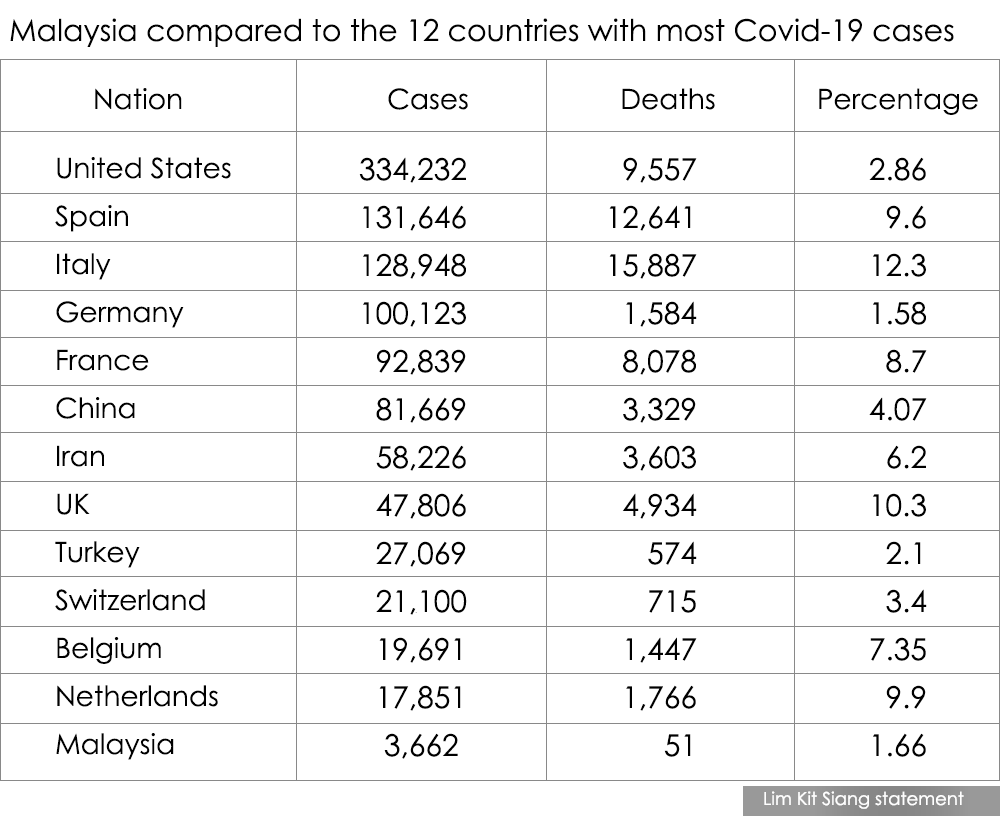Iskandar Puteri MP Lim Kit Siang it was important for the government to “learn from the best practices – both public health and economic – of other countries in combating the invisible global war” and present a package that can “rescue” SMEs in Malaysia.
“The Malaysian Trades Union Congress (MTUC) statement yesterday calling on Putrajaya to ensure that workers’ interests are protected as part of a pivotal condition for SMEs to obtain government assistance raises the question why the government is so slow and tardy in presenting a comprehensive package to rescue SMEs in the Covid-19 pandemic economics when compared to other countries like the UK, Germany, France, Denmark, Australia and Singapore?
“It could be argued that in these extraordinary times of the Covid-19 pandemic when there is a virtual lockdown of economic activities, the failure to quickly and nimbly address medical and economic problems is a form of irresponsibility and negligence,” the DAP veteran politician said in a statement today.
He called on Prime Minister Muhyiddin Yassin to be “more sensitive” to the plight of the vulnerable groups, such as those rendered unable to work due to the movement control order (MCO) which ordered a partial shutdown of all non-essential services and businesses.
Muhyiddin, he added, should also explain why the government was holding back from holding an emergency meeting of Parliament, even a
virtual one, to debate the Covid-19s pandemic.
Lim was citing a statement by MTUC yesterday that called on the government to ensure the new stimulus package includes conditions and provisions to safeguard the
welfare of employees – to prevent employers from laying off workers or cutting their wages.
This comes as Finance Minister Tengku Zafrul Tengku Abdul Aziz said his ministry was in the midst of refining a special stimulus package for SMEs to ease their current difficulties, which is expected to be
announced this week pending cabinet approval.
However, in a latest development, Muhyiddin is expected to announce additional stimulus measures
for SMEs later today.
Lim, meanwhile said: “The Covid-19 pandemic is not just a health crisis – it is an existential economic crisis and policymakers must adjust their approach on a daily basis as the increasing severity of the health pandemic and damage to the economy unfolds.
“Tengku Zafrul and other policy-makers in the government should be motivated by the ‘Act Fast and Do Whatever It Takes’ spirit to address the economic problems created by the Covid-19 pandemic.”
On March 27, Muhyiddin’s Perikatan Nasional government announced an
RM250 billion Prihatin economic stimulus package, which included RM100 billion to support the business community, including SMEs.
It also included a three-month, RM5.9 billion
salary subsidy scheme to prevent loss of jobs and earnings in the wake of the Covid-19 outbreak.
The scheme applies to all workers earning below RM4,000 and employers experiencing loss of income of more than 50 percent since Jan 1, 2020.
Previously, a sum of RM20 billion has already been allocated for the stimulus package announced on Feb 27.
Meanwhile, in a separate statement, DAP’s Bangi MP Ong Kiang Ming (below) claimed assistance to address the specific needs of the SMEs in Malaysia has not been forthcoming since the initial announcement in February.
He called on the government to help SMEs, address the challenges of covering overheads as a result of the MCO, facing an uncertain business environment in 2020 after the lifting of the MCO and policy uncertainty including over the possible extension of the MCO.
“Immediately after the announcement of the Prihatin economic stimulus package by Muhyiddin on March 27, there was an outcry among the SMEs that they have been left out from this package. I have been waiting for more than a week to see if the government would listen to the cries from the SMEs.
“But despite meetings with some of the key Economic Affairs Minister in the Prime Minister’s Department Mustapa Muhammed and Transport Minister Wee Ka Siong, assistance to address the specific needs of the SMEs in Malaysia has not been forthcoming,” said Ong.
In his statement, the former international trade and industry deputy minister included several examples where SMEs were left out.
These include an owner of a small restaurant chain at malls who has 30 staff preparing and serving food, earning around RM3,000 monthly wage, including allowances and overtime.
“This works out to an overhead of approximately RM100,000 per month including EPF and Socso payments. The owner chooses not to have delivery services because she does not want her staff to travel to work and risk getting infected. She still has to pay a monthly rental of RM5,000 per outlet since the rental was not waived by shopping malls which she operates in.
“She will not likely be able to take advantage of the RM600 a month subsidy from the government because she has to conserve cash flow and close one outlet and retrench 10 staff. She has to incur overhead cost of at least RM100,000 during the MCO without any revenue.”
Other examples include – small manufacturer and distributor of non-essential items; small hotel owner and operator; retailer in a small town; long-distance bus operator; gym owner and operator; event organiser; mid-sized law firm and printer in East Malaysia.
“These examples are not meant to be comprehensive. They are meant to illustrate the challenges which SMEs across the service and manufacturing sectors are facing now because of the direct and indirect impact of the Covid-19 virus which has been exacerbated by the MCO.
“…Will the government hear their cries this week, the third week of the MCO or will their cries continue to fall on deaf ears?” MKINI
Think tank: 40 pct of startups, social enterprises will fold without help
Future Digital, the think tank arm of The National Tech Association of Malaysia (Pikom), has warned that 40 percent of startups and social enterprises will fold by June if help is not forthcoming during the current economic downturn brought about by the Covid-19 pandemic.
“The current stimulus also provides little or no help for technology startups.
“These technology startups do not qualify for most loans as most are less than a year-old without a track record and do not meet the minimum staffing count required,” Future Digital chairperson Ganesh Kumar Bangah (photo) said in a statement.
“Should the Movement Control Order be extended for the next few weeks, it would be difficult for many of these companies to survive as they may have insufficient cash flow,” he added.
He also pointed out a survey conducted by the Malaysian Global and Innovation Centre (MaGIC) in March which indicated fewer than three percent of startups will survive if the Covid-19 pandemic drags on for the next 12 months.
Ganesh recommended the government to provide immediate and medium-term liquidity and funding to technology startups.
Among others, he suggested that RM200 million from the allocated RM4.5 billion to assist small and medium-sized enterprises (SMEs) under the current stimulus package is used to help technology companies and startups.
He said the money can be managed by funding agencies such as the Malaysia Venture Capital Management Berhad and Malaysia Debt Ventures, in cooperation with other government agencies such as Malaysia Digital Economy Corporation (MDEC) and MaGIC which has strong roots in the tech and startup community.
“The funding agencies should also work with private funding entities such as venture capitalists, angel investors and crowdfunding platforms.
“These government funds should be provided on a matching basis to companies that can raise funding from these private funding entities,” he said.
Citing the Department of Statistics, Ganesh said Malaysia’s digital economy contributed RM267 billion or 18.5 percent of gross domestic product in 2018.
“The Malaysian startup ecosystem contributed a total of RM3.4 billion to the nation’s GDP from 2008 to 2016 and is projected to reach RM30.8 billion by 2030, giving it a significant role in nation-building.
“Within the same period, the digital ecosystem had also created 80,600 new full-time jobs, attracted investment of RM1.3 billion in private and foreign funds and produced permanent recurring income effects on the economy,” he added.
Pikom is an association representing the information and communications technology industry in the country.
Muhyiddin is expected to announce additional stimulus measures later today to aid SMEs.
This comes after industry players complained that the initial RM250 billion stimulus plan, announced on March 27, was
insufficient to help SMEs and to stave off mass job losses.
To combat the coronavirus, the country has gone into a partial lockdown since March 18.
The MCO was supposed to end on March 31 but was extended until April 14.
Under the MCO, all non-essential businesses and services must close while people are only allowed to leave their homes for pressing reasons such as to restock food supply.
The measures have brought a large section of the country’s economy to a standstill.
As of noon yesterday, Malaysia recorded 3,662 Covid-19 cases with 61 deaths.
Globally, 1.27 million people have been infected and 69,459 have died. – MKINI
MKINI




No comments:
Post a Comment
Note: Only a member of this blog may post a comment.